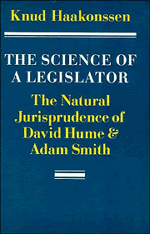Book contents
- Frontmatter
- Contents
- Acknowledgements
- List of abbreviations
- Chapter 1 Introduction
- Chapter 2 Hume's theory of justice
- Chapter 3 Smith's moral theory
- Chapter 4 Smith's theory of justice and politics
- Chapter 5 Smith's analytical jurisprudence
- Chapter 6 Smith's critical jurisprudence
- Chapter 7 Smith's historical jurisprudence
- Chapter 8 Natural jurisprudence in the face of history
- Notes
- Bibliography
- Index
Chapter 2 - Hume's theory of justice
Published online by Cambridge University Press: 04 April 2011
- Frontmatter
- Contents
- Acknowledgements
- List of abbreviations
- Chapter 1 Introduction
- Chapter 2 Hume's theory of justice
- Chapter 3 Smith's moral theory
- Chapter 4 Smith's theory of justice and politics
- Chapter 5 Smith's analytical jurisprudence
- Chapter 6 Smith's critical jurisprudence
- Chapter 7 Smith's historical jurisprudence
- Chapter 8 Natural jurisprudence in the face of history
- Notes
- Bibliography
- Index
Summary
One theory or two?
When Hume refused to follow Francis Hutcheson's advice to preach morality at the same time as he explored its foundations, he clearly implied that his task was a factual and descriptive one. But when he added that his own ‘Metaphysician may be very helpful to a Moralist’, we can take it that he was aware of the principle that ‘ought implies can’, and that his view of the ‘cans’ was highly relevant for what view one should take of the ‘oughts’. The roots of the latter are given us by nature in the form of the activating forces in our life, as passions. In this sense the foundation of morality is private and subjective. And yet morality as such is something public and objective: it is that which binds people together and makes a society possible, and in this function it is dependent upon the existence of a common moral language.
Hume's task in his moral philosophy is, therefore, completely analogous to his task in epistemology: to explain how a common world is created out of private and subjective elements. For, as he expresses it, ‘'twere impossible we cou'd ever make use of language, or communicate our sentiments to one another, did we not correct the momentary appearances of things, and overlook our present situation’; fortunately, ‘Such corrections are common with regard to all the senses’ (T. 582; my italics).
- Type
- Chapter
- Information
- The Science of a LegislatorThe Natural Jurisprudence of David Hume and Adam Smith, pp. 4 - 44Publisher: Cambridge University PressPrint publication year: 1981
- 2
- Cited by

